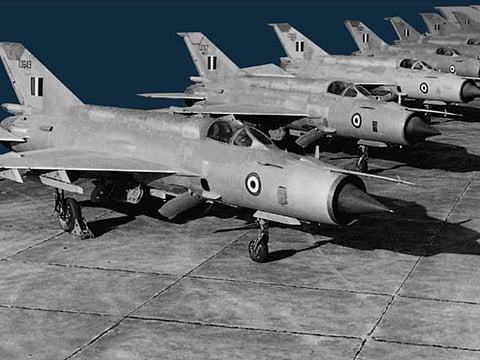

NEW DELHI: With an aim to raise the contribution of the private sector towards defence and aerospace manufacturing, the Government on Thursday decided to sanction seven new projects to them under the Technology Development Fund (TDF) scheme. While it will nurture industries, especially MSMEs and start-ups, this step is part of the larger plan to bring down the country's dependency on defence imports.
These projects sanctioned will be in direction to meet various requirements of the Armed Forces and aerospace and defence sectors. The TDF scheme is a flagship programme of the Ministry of Defence executed by DRDO under the 'Make in India' initiative. It has various objectives including providing Grant in Aid to Indian industries.
The Ministry of Defence (MoD) in a statement said, these project sanctions "are a testimony to the continuing endeavour of DRDO in nurturing industries, especially MSMEs & start-ups, in defence and aerospace domains. The Indigenous development of these technologies will strengthen the military-industrial ecosystem."
The sanctioned projects include the Indigenous Scenario and Sensor Simulation Toolkit, Underwater Launched Unmanned Aerial Vehicle, Long-range Remotely Operated Vehicles for Detection and Neutralisation and Development of Indian Regional Navigation Satellite System-based Timing Acquisition & Dissemination System.
The other three projects sanctioned to the private sector include the Development of Ice Detection Sensor for Aircraft, the Development of a Radar Signal Processor with an Active Antenna Array Simulator and the Development of Graphene-Based Smart and E-textiles for Multifunctional Wearable Applications.
The Indigenous Scenario and Sensor Simulation Toolkit involves the development of an indigenous toolkit for simulator training of pilots in realistic scenarios. This will help in full mission planning and large-force engagement. The project has been awarded to Noida, Uttar Pradesh based start-up, Oxygen 2 Innovation Pvt. Ltd.
The Underwater Launched Unmanned Aerial Vehicle project awarded to Sagar Defence Engineering Pvt Ltd of Pune, Maharashtra relates to a versatile marine battlefield accessory that can be deployed in multiple combat roles. The objective is Intelligence, Surveillance and Reconnaissance (ISR) and Maritime Domain Awareness (MDA).
The long-range Remotely Operated Vehicles for Detection & Neutralisation are dual-use systems that will enable the detection, classification, localisation and neutralisation of underwater objects while keeping the key assets away from the suspected operational area. The project has been awarded to a start-up, IROV Technologies Pvt Limited, Kochi.
Bengaluru-based Craftlogic Labs Pvt. Ltd. will be developing an Ice Detection Sensor for Aircraft. This project aims to develop detecting icing conditions inflight, caused by supercooled water droplets that freeze after their impact against the aircraft's external surfaces and is utilised by the aircraft for turning on the aircraft Anti-icing mechanism.
The Radar Signal Processor with Active Antenna Array Simulator, to be developed by Data Pattern (India) Limited of Chennai, will enable the deployment of multiple target systems for test and evaluation of multiple short-range aerial weapon systems. It serves as the basic building block for larger radar systems.
The project to develop an Indian Regional Navigation Satellite System-based Timing Acquisition and Dissemination System has been sanctioned to Accord Software and Systems Pvt. Ltd., Bengaluru. This project is aimed at enabling indigenisation of timing acquisition and dissemination system, the use of the Indian Constellation for acquiring time and the development of a customised and flexible timing system as per range requirements.
The start-up, Alohatech Private Limited, Coimbatore has been sanctioned the project which will produce advanced nanocomposite materials-based E-textiles utilising the inherent advantages for practical clothing applications.
Alohatech will develop Graphene Based Smart & E-textiles for Multifunctional Wearable Applications.
As reported earlier an independent defence industrial base is an index of strategic autonomy on the international stage. It also helps avert possible coercion by supplier states. India has remained a top arms importer for years.
While the country was importing arms and equipment from Russia for decades, it is now sourcing its requirements from various countries, including Israel, France and the US. India became the biggest arms importer in 2007 and has largely maintained this position since 2009.
DRDO is the Research and Development (R&D) wing of the Ministry of Defence mandated to work on cutting-edge defence technologies to achieve self-reliance in critical defence technologies and systems. DRDO also manufactures equipment for our armed forces with state-of-the-art weapon systems and equipment following the requirements laid down by the three Services.